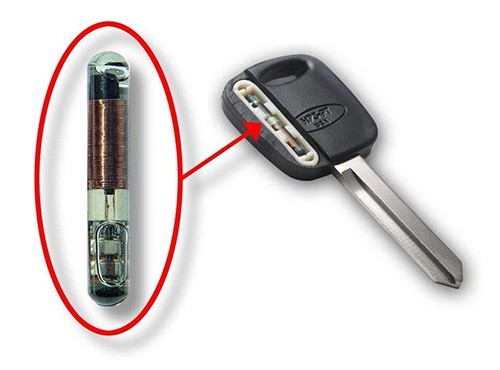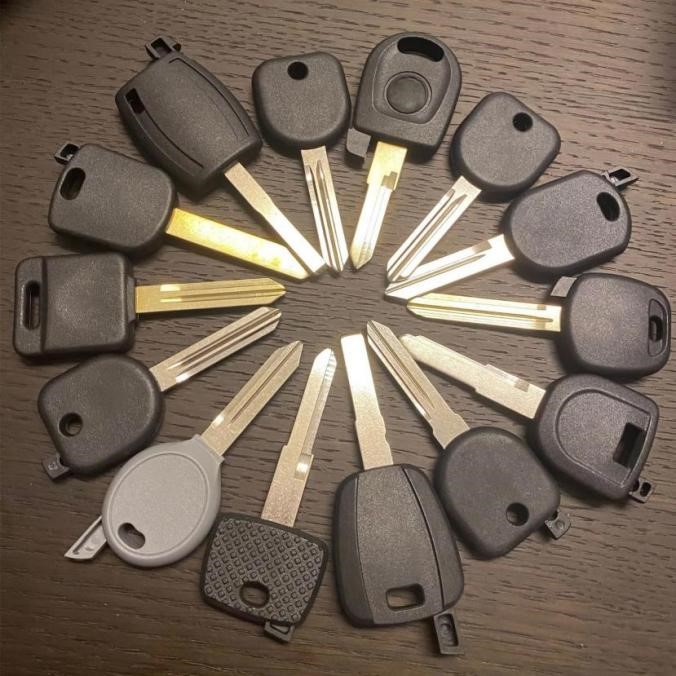WhatsApp
Email:market@wkkeyremote.com
Views: 0 Author: Site Editor Publish Time: 2025-06-27 Origin: Site









In modern vehicles,car keys have evolved far beyond their traditional mechanical function. One of the most important innovations in car key technology is the transponder chip. A small microchip embedded in your car key, the transponder chip plays a crucial role in ensuring your car’s security. If you’ve ever wondered what a transponder chip is, how it works, and why it’s essential for your car, you’re in the right place. This article will explain everything you need to know about transponder chips in car keys.
A transponder chip is a small microchip embedded within your car key. The chip contains a unique identification code that is used by the car’s immobilizer system to verify that the key is authorized to start the vehicle. Without this chip, even if you have a physical key, your car will not start, as the immobilizer system won't recognize the key as legitimate.
The communication between your car and the transponder chip in the key is based on Radio Frequency Identification (RFID) technology. When you insert the key into the ignition or press a button to start the car, the transponder chip emits a signal. This signal is received by the car's immobilizer system, which then verifies that the code matches. If it does, the immobilizer system disables the vehicle's anti-theft system, allowing the car to start.
The immobilizer system is a security feature designed to prevent unauthorized access to your vehicle. Without the correct transponder chip signal, the immobilizer will keep the car from starting, even if someone tries to hotwire the vehicle. This adds an extra layer of protection against theft by ensuring only the authorized key can be used to start the car.
Fixed code transponder chips have a unique, static code embedded in the chip that never changes. When the key is used, the immobilizer system checks if the code in the transponder chip matches the code stored in the car’s system. While these chips are effective in preventing unauthorized access, they are not as secure as newer technologies.

Pros:
Simple and reliable: Fixed code chips are straightforward to program and use. Once programmed, they work consistently and are easy to maintain.
Cost-effective: Because they don’t require complex technology, fixed code transponder chips are typically cheaper to produce and replace.
Cons:
Vulnerable to cloning: Since the code remains fixed, it’s easier for a thief to intercept the signal and create a duplicate key. This makes the system less secure compared to newer types of chips.
Limited security features: Fixed code chips don’t offer advanced encryption, making them susceptible to hacking or replication with the right tools.
Rolling code chips enhance security by changing the code each time the car key is used. Every time the key is inserted, the transponder chip generates a new code, making it much harder for criminals to intercept and replicate the code. Rolling code systems provide better protection against car theft because they prevent thieves from duplicating the key by capturing a single code.
Pros:
Increased security: With the code changing every time the key is used, it’s almost impossible for thieves to duplicate the key by intercepting the code.
Better protection against theft: Rolling codes are highly resistant to hacking attempts and signal interception, making them ideal for protecting high-value cars.
Cons:
More expensive: Because rolling codes require additional technology and advanced programming, these chips tend to be more expensive than fixed code chips.
Complexity in programming: Rolling code chips may require more sophisticated tools and expertise for programming, especially when replacing or duplicating keys.
The Philips Crypto transponder chip is one of the most advanced types of transponder chips available. It uses advanced encryption technology to protect your car against theft. The encryption makes it extremely difficult for hackers to clone the key or interfere with the communication between the key and the car’s immobilizer system. This type of chip is typically found in high-security vehicles.
Pros:
High-level security: The use of encryption technology makes the chip highly secure, offering robust protection against cloning, hacking, and signal interception.
Nearly impossible to duplicate: The advanced encryption in Philips Crypto transponder chips ensures that even with the latest hacking techniques, the key cannot be easily copied or reproduced.
Cons:
Higher cost: Due to the sophisticated technology and encryption, Philips Crypto chips are one of the most expensive types of transponder chips available.
Programming complexity: These chips require advanced programming equipment and may be harder to program or replace, making it necessary to seek professional help.
The primary reason transponder chips are used in car keys is to prevent car theft. Traditional car keys can be easily copied or picked by thieves. However, because transponder chips use unique identification codes and RFID technology, it is virtually impossible to start a car without the correct key. This significantly reduces the risk of unauthorized access.
Pros:
Enhanced security: The transponder chip helps prevent hotwiring and unauthorized starting, making it much more difficult for thieves to steal your car.
Peace of mind: Knowing that your car has an additional layer of security helps you feel safer when parking in public or leaving your vehicle unattended.
Transponder chips provide a secondary level of protection beyond the mechanical key. Even if someone were to break into your car and try to hotwire it, the vehicle won’t start without the corresponding transponder chip. This added layer of security helps reduce car theft and provides peace of mind to car owners.

Pros:
Protection against unauthorized entry: The immobilizer system ensures that no one can start the car without the proper key, even if they have gained access to the vehicle.
Additional safety: Transponder chips make it harder for criminals to bypass the ignition system, ensuring the car remains secure.
Many car insurance companies offer discounts to drivers whose vehicles are equipped with transponder keys due to the reduced likelihood of theft. A vehicle with a transponder chip is considered less risky, which may lower insurance premiums. It’s important to check with your insurance provider to understand how your vehicle’s security system can affect your coverage.
Pros:
Lower insurance premiums: Vehicles with transponder chips are considered less vulnerable to theft, which may result in cheaper premiums.
Increased insurance coverage: Some insurance companies may offer better coverage for cars equipped with advanced security features like transponder chips.
To use a transponder key with your car, it needs to be properly programmed to sync with the vehicle’s immobilizer system. This process involves writing a unique code to the chip that matches the vehicle’s security system. Key programming can be done by a dealership, locksmith, or even through specialized equipment if you want to do it yourself.
Pros:
Efficient programming: With the right tools and knowledge, key programming can be done quickly and accurately by professionals.
Easy integration: Once programmed, the key will seamlessly work with the car’s immobilizer system, providing hassle-free security.
Cons:
Requires specialized equipment: Programming a transponder key can be difficult without the proper tools or software, which might require professional assistance.
Potential for errors: Incorrect programming can result in the key not being recognized, making it impossible to start the car.
If the key is not programmed correctly, the transponder chip will not communicate with the car’s immobilizer system, and the car will not start. Therefore, it is crucial to ensure that the key is properly programmed, either by a professional or using the correct tools.
Pros:
Guaranteed functionality: Proper programming ensures the key will work as expected with the vehicle’s security system.
Reliability: A well-programmed transponder key will consistently perform its security function without fail.
Cons:
Cost of professional programming: Having the key programmed professionally may involve additional costs, especially if you need to replace a lost key or reprogram a damaged one.
Time-consuming process: Depending on the vehicle and the complexity of the key, programming might take time, especially if you’re working with a newer model.
Transponder chips in car keys are a vital component of modern vehicle security. They offer a high level of protection against theft by ensuring that only the authorized key can start the car. While there are different types of transponder chips, each with its pros and cons, they all serve the same purpose of preventing unauthorized access to the vehicle. By understanding the role of transponder chips and their advantages, car owners can appreciate their importance in securing their vehicles and reducing the risk of theft.
A: No, transponder keys are car-specific and must be reprogrammed for a different vehicle.
A: Look for a small chip inside the key’s plastic casing or ask a locksmith for confirmation.
A: Generally, no. The key and car’s immobilizer system are linked with a unique code.
A: If malfunctioning, the car won’t start, and the chip may need replacement or reprogramming.
 WhatsApp
WhatsApp